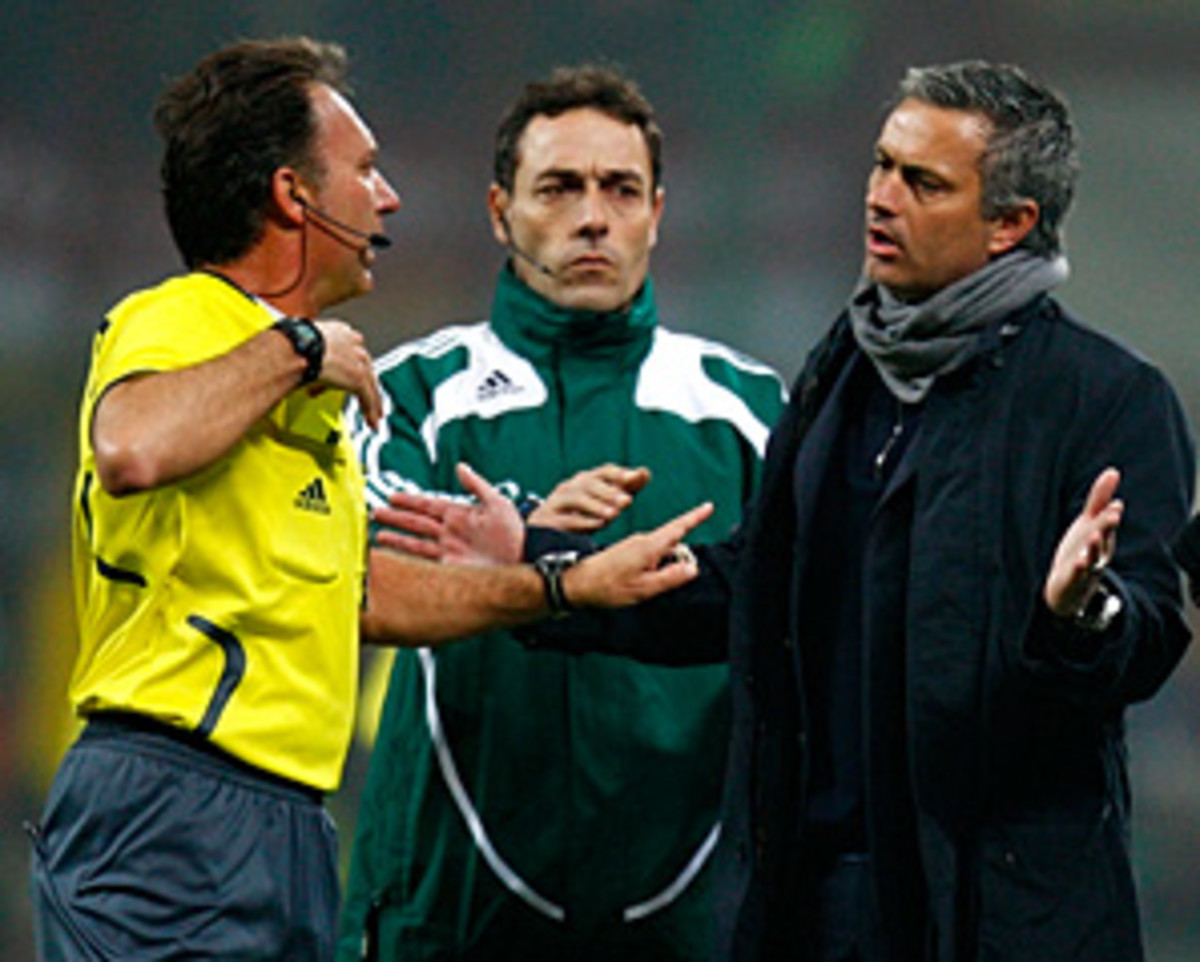Behind José's madness, a method
Here's a little game you can play at home. Type the words "Mourinho" and "referee" in your search engine. When I do it, I get more than 3 million hits. Here are some random headlines:
• "Mourinho's referee rancor failing football" (March 3, 2005).
• "Mourinho: Referee must be careful" (April 12, 2005).
• "Mourinho: Referee cost us derby match" (Sept. 29, 2008).
• "UEFA will not act over Mourinho referee comments" (Feb. 25, 2009).
• "Mourinho questions referee" (Jan. 18, 2010).
• "Mourinho thinks the world is against him" (Jan. 26, 2010).
And that's just on the first page.
If you were unfamiliar with José Mourinho (or even if you are), you might conclude that he is either a victim of a vast and powerful officiating conspiracy that follows him everywhere he goes or a deluded and paranoid complainer.
He went into overdrive after the Milan derby last week, crucifying referee Gianluca Rocchi and talking about how, despite his Inter Milan team's nine-point lead in Serie A, winning the title would be difficult because "they" will do "anything" to "stop us." (And that was after a game that Inter dominated -- we can only wonder what might have happened if the Nerazzurri had lost.)
This kind of behavior is nothing new. And, of course, he's not the only manager to do this. The reaction from most of the media is usually one of censure. Criticizing the match officials is seen as akin to making excuses, the refuge of the weak (or weak-minded) and inveterate sore losers. At the same time, there is a minority that buys into it, usually fans of the club doing the complaining. After all, you're not paranoid if everybody really is out to get you.
And, while for a long time we could fool ourselves into thinking that vast conspiracies could never happen, sadly, we now know that this is not the case, especially in Italy, home to the Calciopoli scandal that saw Juventus relegated and other clubs found guilty of exerting unfair influence on match officials.
The problem with conspiracies is that they are -- by their very nature -- hidden. It's extremely difficult -- but not impossible, as Calciopoli showed -- to prove that referees are part of a vast plot. On the other hand, it's impossible to prove that they are not part of a huge conspiracy. And that's why complaining the way Mourinho did still gets mileage. You really can't definitively prove him wrong, even if there is almost no circumstantial evidence (as is the case here).
Still, left unresolved is why managers complain. Do they really believe what they're saying? (Possibly.) Are they aware it's all hogwash, but nevertheless feel better after they vent their anger? (Maybe.)
But perhaps there's a third reason: planting a seed of doubt. If you complain enough about a referee's performance -- especially if you're at a big club that gets plenty of media coverage -- you will hurt the referee's reputation, no matter how baseless your accusations. It's just human nature. If you accuse your neighbor of being a thief, even if he's fully exonerated, you can be sure he'll go out of his way to be extra honest in the future. At least, that's the idea.
Of course, this is a bit different. But the logic is largely the same. If I spend the whole week leading up to a game suggesting the referee is biased against my team, there's a good chance the referee will want to prove me wrong come match day. And how does he do that? Maybe by sending some of those 50-50 calls my way.
And if I complain loudly enough after the game, it will not only deflect attention from my team's deficiencies and give me a convenient excuse if things did not go my away, but it will also send a message to the referee: "This guy will complain loudly if you make a mistake against him." Which, again, may prompt the next referee to give me the benefit of the doubt.
Ultimately, that's what it boils down to: getting the marginal calls. Sometimes referees make huge mistakes because they simply don't see things properly. There isn't much you can do about that and, in any case, most referees are honest. If they're sure about a decision (even if they're wrong), they'll call it as they see it.
But it's the other calls -- the half-dozen or so times a referee could give a penalty for pushing or pulling in the box, the tactical fouls in midfield that may or may not be punished with a yellow, the bookings for dissent, the borderline off-side decisions (yes, linesmen are affected by this, too), etc. -- that you have to worry about.
If you're the kind of manager who never complains about the officiating, you may well find that, when it's 50-50, those decisions will go against you. Especially if you're up against a guy who regularly rants at referees after games.
Mourinho is too confident and self-assured to rant simply to make himself feel better. And he's too intelligent to make sweeping accusations with no evidence. Odds are, if he does moan about the officials, he does it because he thinks, over time, his club will get an edge -- however small.






